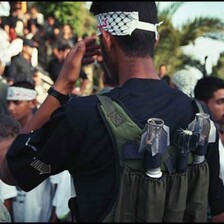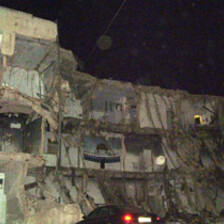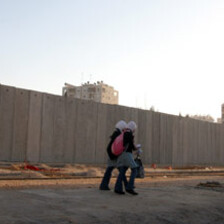Palestine Report 19 January 2005
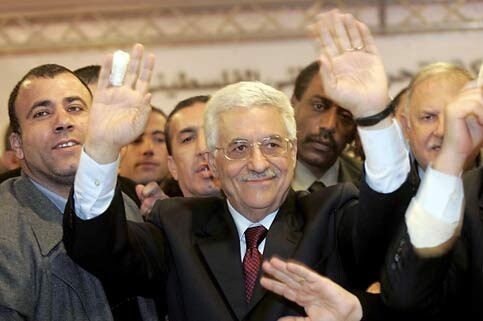
Palestinian President Mahmoud Abbas celebrates his election victory in Ramallah, 9 Januuary 2005. (ALFRED/SIPA)
Only hours after Mahmoud Abbas was sworn in as president of the Palestinian Authority, he found himself in the middle of a crisis. The Israeli government announced it would freeze all contacts with him, prompting negotiations affairs minister Saeb Erekat to accuse Israel of planning to do to Abu Mazen what it had done to the late President Yasser Arafat, who ended up besieged in his headquarters and almost completely frozen out of the diplomatic loop.
Events had snowballed for the new president after a joint operation by three armed factions on the Mintar (Karni) Crossing on January 14 claimed the lives of six Israelis. Israel considered the attack a blunt challenge to the Abu Mazen government and the Israeli ambassador to Washington Daniel Ayalon said his government would not grant Abu Mazen a grace period and that Abbas must immediately fight “terrorism.”
For his part, Abu Mazen condemned the operation and the subsequent Israeli air raids, saying neither serves peace.
The factions that carried out the attack - the armed wings of Hamas and Fateh as well as the Nasser Salah Eddin Brigades of the Popular Resistance Committee - denied that their operation was aimed at challenging Abu Mazen, saying it was a response to the Israeli crimes in the Gaza Strip.
According to Hamas spokesman Mushir Al Masri, “Hamas has no intention of placing any obstacles in front of Abu Mazen. The goal of the military operations is to defend the Palestinian people and to respond to the crimes of the occupation.” Al Masri says the dialogue between Hamas and Abu Mazen is ongoing and that Hamas is interested in maintaining a good and smooth relationship with the PA.
Abu Musaab, an Aqsa Martyrs activist, said the operation had nothing to do with the political situation, but was a response to the crimes of the occupation. The Izzedin Qassam Brigades, Hamas’ armed wing, was of the same opinion, saying the operation was not directed at any particular person or at the Palestinian government but rather was a response to Israeli army operations in the Gaza Strip.
Informed sources in Hamas also told the Palestine Report that the group is not interested in creating any tension with Abu Mazen. Proof of this, they say, is the halt in the firing of Qassam rockets the day before and the day of the presidential elections on January 9. The sources also said that Hamas and Fateh had agreed earlier in the week to calm any inflammatory rhetoric in the media.
Nevertheless, many observers and analysts in the Gaza Strip feel that even if it was not the intention of the January 14 operation to embarrass Abu Mazen, it has still put him in an awkward position and left him vulnerable to Israeli pressure. A number of criticisms were leveled in the newspapers at the armed groups not only for not giving due consideration to changing circumstances in the region and political pressure to give Abu Mazen time, but also for the choice of target.
The Mintar Crossing is the only conduit for much needed food, medical supplies and aid to Gazans, but is not the only crossing to have been targeted. In mid-December the target was the Rafah Crossing, the only crossing through which the people of the Gaza Strip can get to the outside world. The Beit Hanoun (Erez) Crossing between the Gaza Strip and Israel has also come under attack several times. Invariably, Israel closes the crossings following an operation with inevitable negative consequences for peoples’ lives and livelihoods.
Saleem Abu Safiyeh, the director of the Palestinian side of the Mintar Crossing, said he had requested that an armed Palestinian security force presence at the crossing be allowed by the Israeli army commander of the southern district a week ago. The Israelis refused, he said, saying the time was not yet ripe for such a move.
Abu Safiyeh, who is the liaison officer between the PA and Israeli security services, said if such security personnel had been present, the operation, dubbed “shaking the foundations” by the groups who carried it out, would not have been possible.
“The operation was first and foremost harmful to the Palestinians in the Gaza Strip,” says Abu Safiyeh. “This crossing is essential to the lives of the citizens because through it, they are provided with basic necessities such as dairy products, medicine and essential food stuffs that people can’t live without.”
A number of analysts, however, argued that the operation was legitimate because it was carried out on occupied land and was directed at Israeli soldiers. Writer and journalist Hani Habib, for example, says, “Israel is protesting the operation even though it was carried out in an area that has been under Israeli occupation since 1967. The operation also targeted Israeli military personnel, which indicates how aware the Palestinian resistance is about what they are doing.”
Still, Habib concedes that such operations could look like they were aimed at undermining any popular mandate Abu Mazen might have in “organizing the Palestinian home and strengthening the PA to honor the obligations of the roadmap.”
Abu Mazen is likely to focus most of his efforts in the days to come on extracting the promise of a truce from the resistance factions in order to conduct his work in suitable circumstances. He is unlikely to achieve anything as dramatic as a disarming of the groups, a move both Hamas and Islamic Jihad reject.
According to sources in Hamas, the truce is still under study, adding that the movement is not radical in its position but wants strong guarantees that all forms of Israeli aggression against the Palestinian people will be halted.
Such guarantees are what Abu Mazen appears to be seeking from Israel judging by his speech before a special session of the Legislative Council in Ramallah on January 15 after he was sworn in. Any partnership with Israel, he said, “could not be realized under dictation.” Such a partnership could only come to light “if assassinations, incursions, the siege, settlements, house demolitions and the separation wall are halted.”
This is not the first time a truce between the two sides has been proposed. Over a year ago, Hamas committed to a truce called for by Abu Mazen who was prime minister at the time. Israel broke the truce by assassinating Hamas leader Ismail Abu Shanab in August 2003.
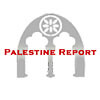
Related links:
